- Home
- Richard Matheson
The Link Page 14
The Link Read online
Page 14
Robert tries to help but is too rattled. He tries, in vain, to use ESP to zero in on the location where Cathy is.
In a few minutes, they have narrowed the possibilities down to twelve. Robert looks at the twelve locations intently.
“Relax,” Peter tells him. “Let it come through by itself.”
Robert puts his hand over the list and closes his eyes.
His lips move in what might be a prayer.
He opens his eyes and points at one of the addresses. “This is it,” he says.
They phone the store. The line is busy.
Robert cannot bear it. He bolts from the ESPA offices, ignoring Peter’s call. He rushes from the building, tries to get a cab, can’t and races down the street, finally grabs a cab from a woman just before she can get in, blurts out the store’s address. “Hurry,” he gasps. “Someone’s going to die.”
The cab speeds through the streets and, sitting in back, a shaken Robert sees, once more, the horrible accident. He shudders. Has it already taken place?
The cab gets caught in traffic a block from the target location. Robert throws a bill to the driver, lunges out and sprints along the pavement, almost knocking people down, oblivious to their curses.
He is halfway down the block when he sees the truck veer sharply, crash into the store front.
“No!” he cries.
He reaches the spot and stands there, panting, staring at the wreckage.
“Robert!”
She is in his arms and they are embracing passionately, kissing. “Oh, my God, I thought I’d lost you.” He is almost crying now.
Cathy clings to him, shaking uncontrollably. “Rob. My darling, darling Rob.”
Moments later, huddling together in a booth of a nearby bar, she tells him that Easton had, at Peter’s insistence, telephoned a Sergeant he knows in the police department who had dispatched a radio car to get her out of the way seconds before the truck hit.
“You saved my life,” she says. “If it hadn’t been for you, I’d be dead now.” The idea horrifies and fascinates her at the same time. Robert has to accept his gift, she says. He can’t fight it any longer. It is too powerful, too valuable to waste.
He can only hold her. “Just don’t leave me,” he keeps murmuring.
“Don’t leave me. Just don’t leave me.”
Robert goes to see Ann and takes her to a local park.
There he tells her what happened, at long last able to offer her the kind of comfort she needs. They’ll work this out together, he says.
For the first time in years, Ann—her father’s arms around her protectively—truly relaxes.
December 19th. Robert and Cathy are driving to JFK to pick up the famous Dutch psychic Jan De Vries who is passing through the New York area en route to Los Angeles and has agreed to some testing at ESPA.
Things have been resolved between Robert and Cathy. She knows she loves him and will go back to England for the Christmas holidays to tell Harry. She hopes she will be able to return in time to attend the San Francisco convention with Robert.
Especially since an additional point of interest has arisen regarding the trip.
While Robert was talking to Alan Bremer about the film, he mentioned the convention and, an hour later, Alan had called back, asking him if the ESPA group could check out a house in Tahoe which appears to be haunted. Strictly hush-hush since its resident is the married daughter of the man who owns the studio and the wife of a well-known country-western singer.
Robert accepted and, of course, Peter is delighted at the thought of getting to see a “real live, purebred” haunted house. It does seem odd, Robert comments, that, living in England, Peter has never had such an opportunity. He’s seen a few, Cathy tells him, but none that impressed him.
She smiles. “He’s so excited,” she says. “I don’t know which he’d rather have, a visit to a real haunted house or a date with the immortal Palladino.”
“Perfect if the ghost turns out to be Palladino,” he says.
Briefly, they discuss his ESP. He has accepted it now. He doesn’t know exactly what to do about it but its existence is a given. Just having it checked at ESPA seems, somehow, inadequate though. Now that he has ceased to resist the idea, he has this feeling that something more is involved in him possessing the gift than just a series of tests regarding it.
“What that something is, I have no idea,” he tells her.
They arrive at the airport and meet DE VRIES, a slim, handsome young man, flamboyant in dress and manner. “Westheimer would love him,” Robert sotto voces when they first see the Dutchman breezing into the terminal.
Handshakes are exchanged, greetings given. De Vries immediately asks each of them to think of three numbers. “What are they, quickly, don’t concentrate,” he commands.
“Three-six-nine,” says Cathy.
“One-seven-uh, eight,” says Robert.
De Vries pulls out a small pad from an inside jacket pocket, tears off the top sheet and hands it to Cathy. 3-6-9 is already printed in pencil on it.
“Mine says 1-7-9,” says Robert when De Vries hands a second sheet to him.
“You changed your mind at the last second,” De Vries tells him confidently.
“Impressive,” says Cathy.
“Very impressive,” De Vries corrects her.
They are almost to the car when De Vries points and says, “See?”
What they see, in front of them, is a STOP sign, it’s iron stand twisted to form three complete loops around an imaginary center of rotation so that the sign itself is only two feet from the ground.
“You?” asks Robert.
“Who else?” says De Vries. His laugh is bark-like. “Looks like a spiral slide for a mouse!” he cries, delightedly.
Robert and Cathy exchange a look. “We did walk by that sign before, didn’t we?” he asks.
“Of course you did!” says De Vries. “Listen. We must trust each other. That way we will start off on the right foot.”
His next request for trust comes when they reach the car. He would like to drive it to ESPA.
“All right,” agrees Robert, slightly taken back.
“Blindfolded,” says De Vries.
A nightmarish but bizarrely amusing ride through Queens at top speed, the blindfolded Dutchman not only driving without mishap but calling out the colors of cars they pass, houses, signs.
“There’s a stop sign, better brake now. Look at that green car, very ugly. There’s a nice house made of bricks, I like it. Here we go again!”
Robert and Cathy, cringing in their seats, validate his descriptions. “Listen, I think this is a trick,” he whispers to her. “Magicians can—”
“No, it’s not a trick!” says De Vries, looking offended. “You must have faith, my friend! Faith will move mountains!”
“And drive cars, I hope,” Robert responds.
The barklike laugh. “Yes! And Drive cars!” says De Vries.
When they reach ESPA, Robert and Cathy, separated momentarily from De Vries, fall into each others’ arms with laughter of dazed relief. “If that was real—” he mutters.
“I kept thinking: did Rob save my life just so this nut could end it?” Cathy says.
A test is going on with the use of a t-v monitor when they rejoin De Vries. One of those present is Teddie.
De Vries tells the gathering. “Let me show you what I can do.”
Holding up his fist, he glares at the t-v set and shouts, “Up! Down! Up! Down!”
Each time he shouts, the picture jumps accordingly.
“That’s nothing,” says De Vries. “Let’s have some tests. But first I have to get my sign from Electra.”
Electra is the name of De Vries “extra-terrestrial intelligence”, the one who helps him “do things”.
He closes his eyes and concentrates. Several moments later, they hear a loud bell-like noise from the next room. “That would be the random choice generator,” Peter says.
“Anybody in th
ere?” Robert asks.
“Not a soul,” says Peter.
“Ready!” announces De Vries.
A whirlwind series of tests by the colorful Dutchman.
A single die is placed in a closed metal box. The box is shaken vigorously by one of the testers and placed on a table in front of De Vries. The challenge: to guess which die face is uppermost.
Eight times the test is performed. Eight times De Vries gets the number right.
“Too easy,” he says. “Move on.”
“Too easy?” Peter says. “The odds against that are approximately a million to one.”
De Vries shrugs. “Nothing,” he says.
Ten identical aluminum film canisters are placed on a table, in one of them a steel ball bearing taped down. After this is done, the man who did it leaves the testing room and De Vries and the others go in. None of them know in which canister the ball bearing is taped.
De Vries runs his hand over the cans. “Empty,” he says. “Empty.” They remove these cans. When only three remain, De Vries tells them which one he believes contains the ball bearing.
He does this twelve times and is correct twelve times.
“One in a trillion,” Peter says, awed.
“Better,” says De Vries. “Now I’m getting hot.”
A ball bearing is placed beneath a bell jar on a glass-topped table. De Vries assignment: make it move.
He tries and tries in vain. It irritates him hugely. Finally, he rolls his eyes heavenward and says, “Come on, help me move this damn thing!”
The ball bearing begins to jiggle back and forth, then rolls quickly to the edge of the bell jar and clangs against the glass.
“All right, now I’m cooking,” says De Vries.
Bracelets, watches and rings are placed on a table. De Vries picks up a heavy silver bracelet belonging to Cathy and strokes it with a finger. “No, no. No, no. It’s too heavy,” he complains. “I can’t do this. This will never work.”
He puts down the bracelet in less than a minute. “Sorry,” he says. “I only meant to bend it.”
The bracelet is broken in two places.
Suddenly De Vries gasps. “What time is it?” he asks.
Robert checks his watch. “One thirty-four.”
“Good God, I have to be at ABC by two!” the Dutchman cries. “Someone get me a cab, quickly!”
They all exchange looks after De Vries has rushed out, torn between awe and laughter.
“Well, you know,” says Peter, ever the gentleman, “Holland is advanced in psi. The first academic lecturer in psi was appointed there, the first lab for scientific research in psi established there. The first international conference for parapsychologists was held there—and there are a large number of Dutch psychics, Dykshoorn, Hurkos and Croiset, for example.”
“He’s still a bonehead,” Teddie says.
They are all laughing when the door to the room opens. Robert’s and Cathy’s laughs choke off at the same time as they see who’s coming in.
Harry.
FIVE
December 29th; en route to San Francisco. Harry and Cathy are sitting together; he has remained through the holidays. What he knows about Robert and Cathy is not established. The fact that he traveled from London rather than wait for her Christmas visit indicates something however.
Robert is sitting with Peter; Carol is remaining home, not ill but disinterested in the convention. Sitting in distant seats are Stafford and Westheimer. (“Won’t it be a thrill having them along,” Robert says.) Alan is paying Robert’s expenses since the Tahoe house is part of it.
Peter is excited about the side trip to Tahoe. “You would think I’d have run across a genuine haunted house somewhere in England,” he says. “Such has not been the case. Maybe this time.” He has made arrangements for them to pick up a young female medium in San Francisco who has done this kind of work before.
This leads to the subject of Robert’s psychic ability; Peter has suspected its existence for some time, he says, verifying what Cathy told Robert. Has Robert considered allowing ESPA to test him? Robert say she has but isn’t certain that he wants to get involved in that. He’s not averse to cooperating with ESPA but he just isn’t sure yet. Probably he will, in time.
“Cathy will be desolate returning home without a chance to be in on it,” Peter says.
Robert draws in labored breath. “I’m sure,” he says. His gaze shifts to where Cathy and Harry are sitting. These may be the last days he will ever see her if she doesn’t make up her mind.
Peter tells him that Cathy has told him about Bart’s death and he extends his sympathy. “I know how horribly I’d feel if I had to have Fritz put to sleep,” he says.
To divert Robert, he tells him—and we see with Peter’s narration—a little anecdote concerning the cat.
At a certain age, Fritz began to wet the living room rug even though he’d gone outdoors since he was a kitten. Every ploy was devised to prevent this but the cat persisted.
Finally—most unhappily for Peter—they came to the conclusion that the cat was incapable of learning and would have to be taken to the animal shelter since no one else would have him.
“I was desolate,” says Peter’s voice. “Except for that abominable habit, Fritz was a total charmer and I loved him dearly.
“The night before he was to be taken to the pound, I sat with him on my lap and explained to him sadly that there was no other way. If he had only mended his ways, this wouldn’t be necessary. As it was however…”
The next morning, as Peter is dressing, Carol comes into the bedroom and, repressing a smile, tell him to look in the bathroom. Curious, he does.
Sitting on the toilet is Fritz, a kingly expression on his face.
“From that day forward,” says Peter’s voice, “so help me God, that marvelous creature has chosen that method to perform his duties.”
Back to the plane. “I can only assume,” concludes Peter, “that he regards himself as a person and not a cat at all.”
They drift into a trivia contest which further helps to take Robert out of the doldrums.
They arrive at San Francisco airport and taxi to a downtown hotel. Robert is glad to be able to tell them that he’s visiting his brother that night. The less he sees of Cathy together with Harry, the better.
The last thing he does with her is give her a look which openly implores, “Are you going to tell him?”
That night, he goes to see John who lives in an interesting condominium overlooking the bay. “You want to go out for dinner?” John asks. Not unless you do, Robert replies; he’s been eating all day.
They sit in chairs that face the spectacular bay view, sip drinks and talk.
During their conversation, we learn, from John, more about their family background. (Possibly, we dramatize it.)
Their father was a physically oriented man, something their mother could never accept which caused an irreparable rift between them. Retreating constantly into silence and prayer, she would only, now and then, erupt in helpless anger at their father.
“You probably don’t remember it,” John says. “You were only a baby when they separated.”
It is clear that John is more inclined to sympathize with their father than Robert.
“How would you feel having your sex drive referred to as ‘succumbing to the level of the beasts’?” he says. “Jesus. Then she goes mute on him, disappears into the bedroom and locks the door. Wouldn’t you get ticked off too?
“No doubt he demanded his conjugal rights one dark and stormy night and you were conceived,” John adds drily. “That was it for the marriage.”
John looks back through the years.
“I like him,” he says. “He was a hard man to know but I like him. You might have too if you’d gotten a chance to spend some time with him.”
Robert, knowing it is probably a waste of time, asks John if he can tell him anything about their mother’s death he doesn’t already know.
John can
only repeat that he was working in the Catskills at the time (“washing dishes for the rich”). Ruth said their mother fell down the stairs and broke her neck. So did Aunt Grace. He looks at Robert suspiciously.
“Why do you keep asking?” he wants to know.
Robert is going to mention the dream—perhaps Teddie’s vision of the old house—then changes his mind.
John returns to the subject of their father. It is clear how hurt he was that their father asked Robert to take over the dig.
“Granted your background is marginally scientific,” John says (he sells insurance), “but, for Christ’s sake, I went with him summer after summer.”
Robert tells him he can still take over the dig if he wants; the money is available. “Forget it,” John says, scowling. “What the hell would I do by myself in the middle of the Arizona desert?”
Later. They have had more than a few drinks and are relaxed a little with each other.
“Listen,” John says. “You’re into weird things. Let me tell you about a weird thing I’ve got going.”
He owns a house on the other side of town which he rents for income. His current occupants are a Vietnamese couple.
“The wife keeps telling me—through her husband, she doesn’t speak English—that there’s ‘something wrong’ with the house.”
John leans forward. “Get this,” he says. “She asked me if there’s been a death in the house. I told her not that I know of and I’ve owned the place for five years.
“Well, the husband called me yesterday morning and told me that his wife ‘feels death’ in the house. She insists that I do something about it.”
Robert is into “all that kind of crap”. Would he like to take a look at the house?
Robert hesitates, not because John has referred to his line of work as “all that kind of crap” but because he still feels somewhat “tenderized” by his newly accepted ability and doesn’t want to do anything foolish.
None-the-less, at John’s prodding, he drains his drink in a swallow and grins. “Why not? What the hell.”

 Earthbound
Earthbound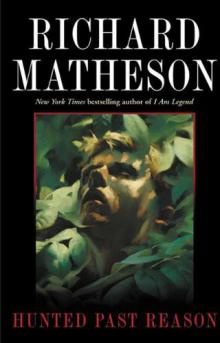 Hunted Past Reason
Hunted Past Reason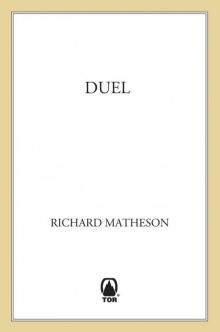 Duel: Terror Stories
Duel: Terror Stories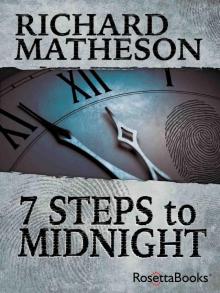 7 Steps to Midnight
7 Steps to Midnight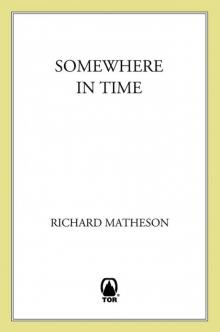 Somewhere in Time
Somewhere in Time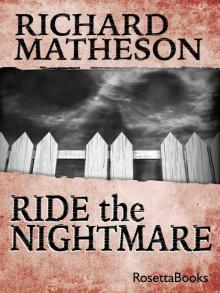 Ride the Nightmare
Ride the Nightmare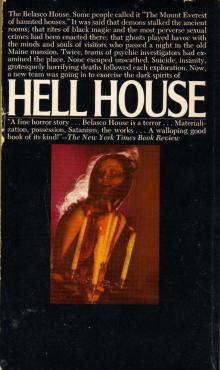 Hell House
Hell House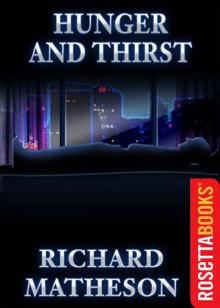 Hunger and Thirst
Hunger and Thirst Lyrics
Lyrics Other Kingdoms
Other Kingdoms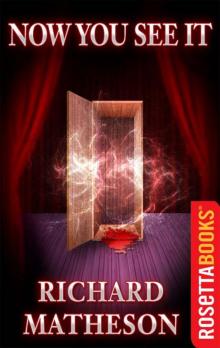 Now You See It . . .
Now You See It . . .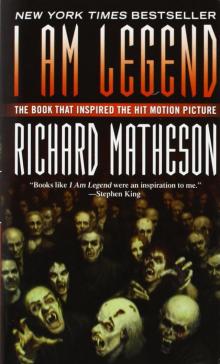 I Am Legend
I Am Legend The Box: Uncanny Stories
The Box: Uncanny Stories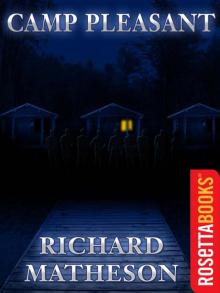 Camp Pleasant
Camp Pleasant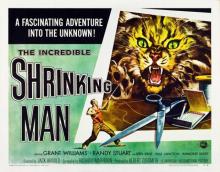 The Incredible Shrinking Man
The Incredible Shrinking Man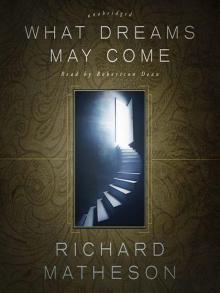 What Dreams May Come
What Dreams May Come The Gun Fight
The Gun Fight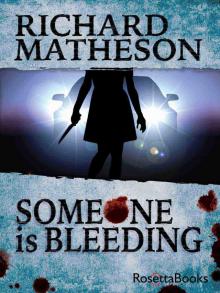 Someone Is Bleeding
Someone Is Bleeding Mediums Rare
Mediums Rare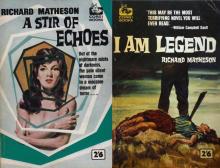 A Stir of Echoes
A Stir of Echoes Backteria and Other Improbable Tales
Backteria and Other Improbable Tales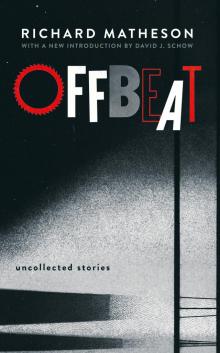 Offbeat: Uncollected Stories
Offbeat: Uncollected Stories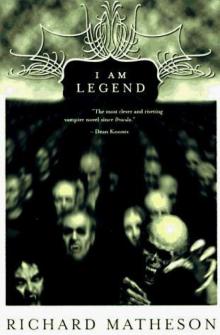 I Am Legend and Other Stories
I Am Legend and Other Stories The Best of Richard Matheson
The Best of Richard Matheson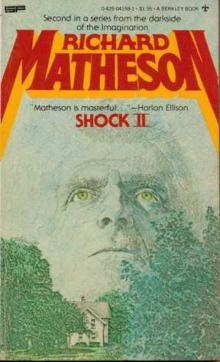 Shock II
Shock II Steel: And Other Stories
Steel: And Other Stories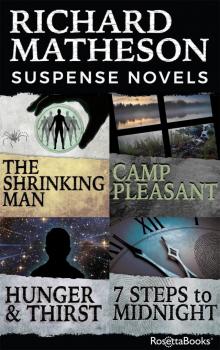 Richard Matheson Suspense Novels
Richard Matheson Suspense Novels The Link
The Link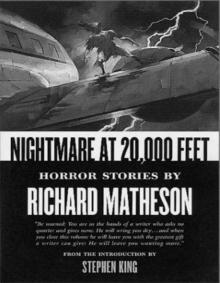 Nightmare At 20,000 Feet
Nightmare At 20,000 Feet Shadow on the Sun
Shadow on the Sun![Steel and other stories [SSC] Read online](http://i1.bookreadfree.com/i/03/21/steel_and_other_stories_ssc_preview.jpg) Steel and other stories [SSC]
Steel and other stories [SSC] Created By
Created By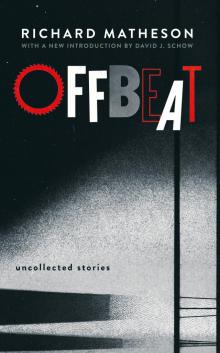 Offbeat
Offbeat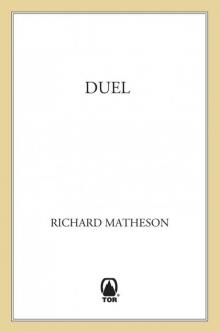 Duel
Duel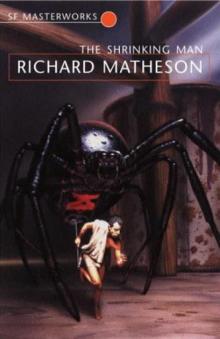 The Shrinking Man
The Shrinking Man Steel
Steel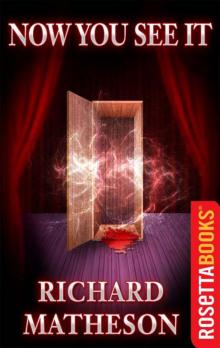 Now You See It
Now You See It